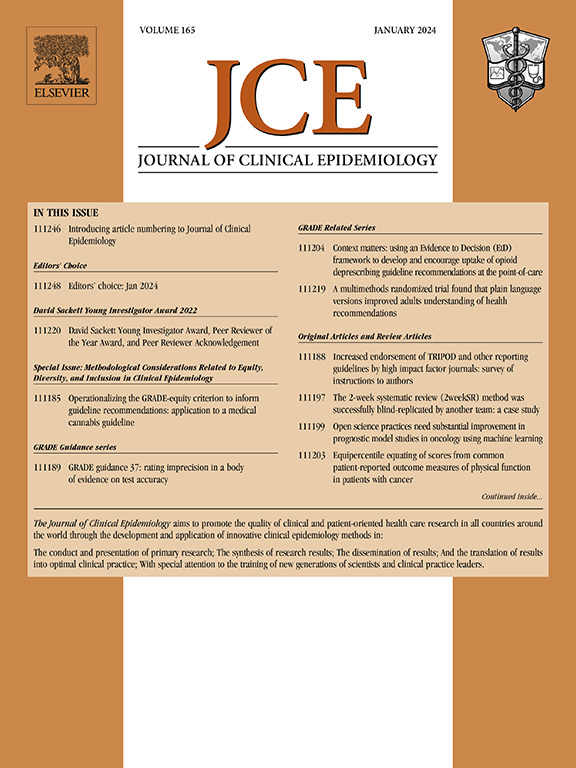将卫生公平考虑纳入企业实践指南的七项原则。
IF 7.3
2区 医学
Q1 HEALTH CARE SCIENCES & SERVICES
引用次数: 0
摘要
背景:健康公平旨在为所有人提供平等、公平的机会,以实现最佳健康。实践指南可以在促进健康公平方面发挥关键作用,然而,很少有机构利用工具来系统地整合健康公平方面的考虑因素。因此,为支持系统整合健康公平因素的实用工具奠定基础非常重要。本手稿提出了将健康公平因素纳入实践指南事业的原则:在为 GIN-McMaster 指南开发核对表开发健康公平扩展项目的过程中,我们成立了一个由指南开发人员、患者、遭遇不公平的公众、健康公平研究人员和指南开发人员组成的多元化咨询小组。我们通过对指南手册的方法学审查以及工作组成员之间的反复讨论,制定了相关原则:结果:我们确定了将健康公平因素纳入实践指南事业的七项原则。1)阐明健康公平;2)考虑健康公平的先验规划;3)选择有不公平生活经历的个人并让其参与其中;4)证据综合中的公平;5)制定以公平为基础的建议;6)包容性知识动员;7)评估健康公平考虑因素的影响。我们利用已发表的实例阐述了这些原则的重要性,并将其映射到指南制定过程的不同阶段:结论:指南制定者在制定指南和健康公平指南制定与评估工具时应遵守这些原则。这些原则是为 GIN-McMaster 指南开发核对表开发健康公平扩展项目的基本概念。本文章由计算机程序翻译,如有差异,请以英文原文为准。
Seven principles for integrating health equity considerations in the practice guideline enterprise
Background and Objectives
Health equity aims to provide all individuals with equal and fair opportunities to achieve optimal health. Practice guidelines can play a pivotal role in advancing health equity; yet, few organizations use tools to systematically integrate health equity considerations. Thus, it is important to establish a foundation for practical tools to support the systematic integration of health equity considerations. This manuscript proposes principles for the integration of health equity considerations in the practice guideline enterprise.
Methods
In the process of developing an equity extension for the GIN-McMaster guideline development checklist, we established a diverse advisory group of guideline developers, patients, members of the public experiencing inequities, health equity researchers, and guideline developers. We formulated the principles informed by a methodological review of guideline handbooks and iterative discussions between working group members.
Results
We identified the following seven principles for integrating health equity considerations into the practice guideline enterprise: (1) articulating health equity, (2) a priori planning for considering health equity, (3) selection and engagement of individuals with lived experiences of inequities, (4) equity in evidence synthesis, (5) developing equity-informed recommendations, (6) inclusive knowledge mobilization, and (7) evaluating the impact of health equity considerations. We elaborated on the importance of the principles using published examples and mapped them to the different phases of the guideline development process.
Conclusion
Guideline developers should adhere to these principles in the development of guidelines and health equity guideline development and appraisal tools. These principles are the foundational concepts for developing health equity extension items for the GIN-McMaster guideline development checklist.
求助全文
通过发布文献求助,成功后即可免费获取论文全文。
去求助
来源期刊

Journal of Clinical Epidemiology
医学-公共卫生、环境卫生与职业卫生
CiteScore
12.00
自引率
6.90%
发文量
320
审稿时长
44 days
期刊介绍:
The Journal of Clinical Epidemiology strives to enhance the quality of clinical and patient-oriented healthcare research by advancing and applying innovative methods in conducting, presenting, synthesizing, disseminating, and translating research results into optimal clinical practice. Special emphasis is placed on training new generations of scientists and clinical practice leaders.
 求助内容:
求助内容: 应助结果提醒方式:
应助结果提醒方式:


